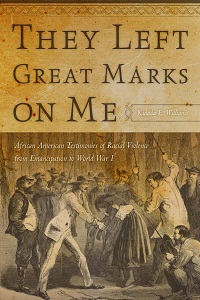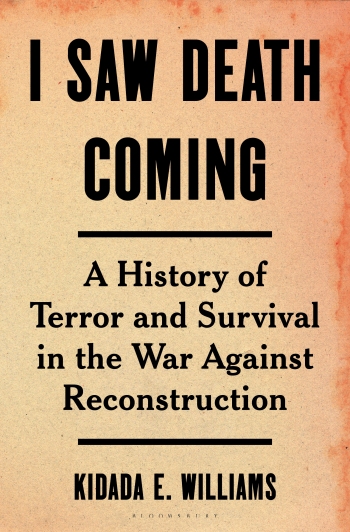
I Saw Death Coming (Bloomsbury, 2023) is now available anywhere you purchase books, including:
Bookshop; Barnes and Noble; Indiebound; Books A Million!; Source Booksellers; Detroit Book City; Pages Book Shop; and Amazon.
Williams has given us an ugly widescreen view of the reign of terror that wracked the South — not during slavery or Jim Crow, but in the very thick of Reconstruction. “I Saw Death Coming” bears witness to a dark malignancy in American history, one we have never fully excised. ~LA Times
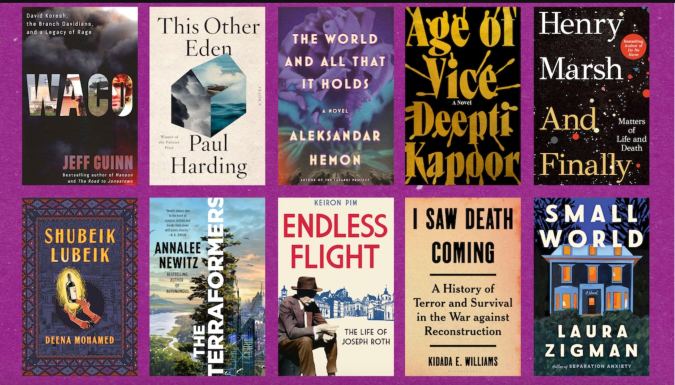
January Books to Read, Washington Post
“I Saw Death Coming is an unflinching and deeply compassionate account of what Black people accomplished, lost and fought for in resisting the war on freedom.” ~Washington Post
What is distinctive and important about “I Saw Death Coming” is its intimate, inspiring, and heart-wrenching depiction of Black men, women and children who lived through “the war after the Civil War.” Or didn’t. ~Florida Courier
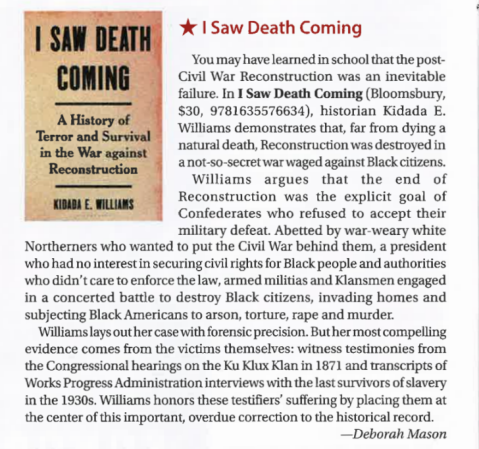
Starred review from BookPage
By focusing on the people — Edward Crosby, the Tutsons, and others — [Williams] ensures that their heroism is no longer forgotten and our country’s history is accurately portrayed. ~Portside
“Wrenching and urgent…As Williams’s and [Mari] Crabtree’s books demonstrate, from the moment slavery ended, through the era of segregation, and up to today, racial terrorism has been, for most Black Americans, too real to ignore. But rather than sink into despair, many Black Americans have leaned on forms of Black cultural expression—call it the blues—to find a way out of no way.” ~The New Republic

Library Journal Starred Review: “Her ability to trace select families through the decades truly reveals the lasting negative effect of Reconstruction-era terror on those who had hope snatched away. She reveals the seeds of social racism from the past, which sadly remain firmly planted. VERDICT: A recommended heart-wrenching read that provides significant insight into the historical basis of racial conflict in the United States.”

Daily Kos Jan 17 New Nonfiction Reads
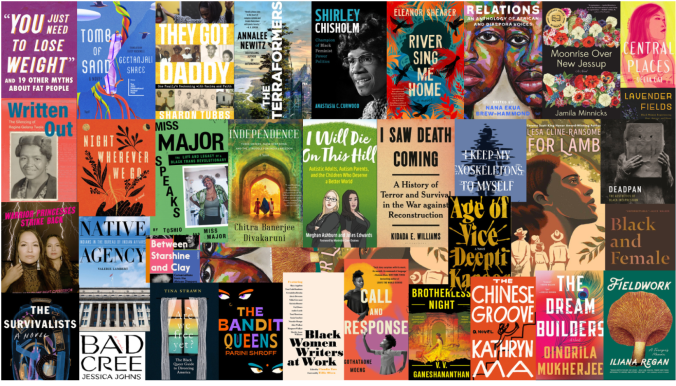
Ms. Magazine’s January 2023 Reads for the Rest of Us https://msmagazine.com/2023/01/06/feminist-books-writers-women-lgbtq-january-2023-reads-for-the-rest-of-us/
Williams offers an insightful reexamination of the Reconstruction period and the African American people who lived through it. By centering formerly enslaved people’s experiences, Williams challenges previous exclusion, misrepresented understandings and disputed legacies. ~ Ms. Magazine


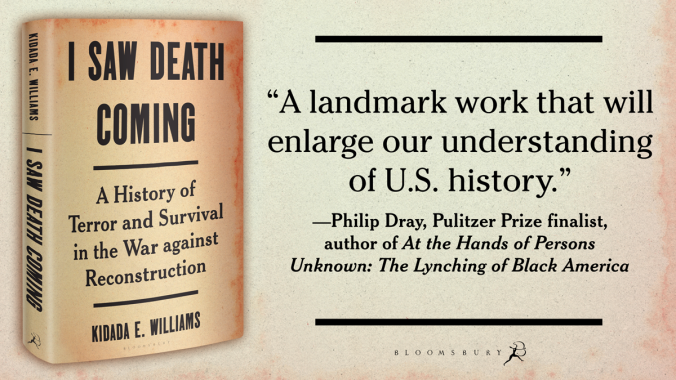
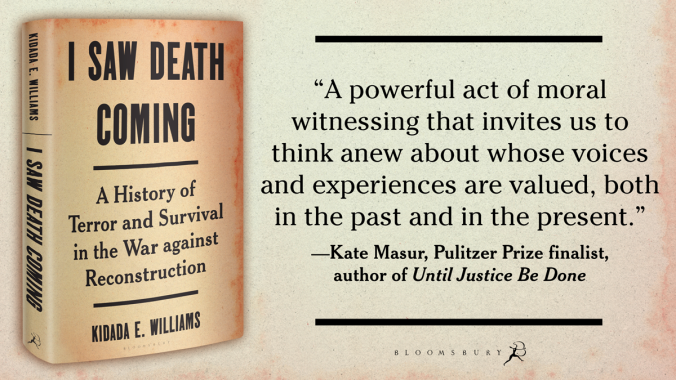

Charleston Syllabus: Readings on Race, Racism, and Racial Violence (University of Georgia Press, 2016) co-edited with Chad Williams and Keisha N. Blain.
Available at: Barnes & Noble; Books a Million; Indiebound; Bookshop; Source Booksellers; Pages Book Shop; Detroit Book City; and Amazon
They Left Great Marks on Me: African American Testimonies of Racial Violence from Emancipation to World War I (New York University Press, 2012).
Available at: Bookshop; Books a Million; Barnes & Noble; Indiebound; Source Booksellers; Pages Book Shop; Detroit Book City; and Amazon
Articles, Essays, & Chapters
“Legacies of Violence,” in Kinshasha Holman Conwill and Paul Gardullo, eds., Make Good the Promises: Reclaiming Reconstruction and Its Legacies, (2021), 98-113.
“Writing Lynching Victims’ Personhoods and People into the History of Lynching,” Journal of the Gilded Age and Progressive Era 19, no. 4 (2020)
“Never Get Over It: What Night-riding Meant to African American Families,” in Reconstruction and the Arc of Racial (in)Justice (2018), 59-83.
“Maintaining a Radical Vision of African Americans in the Age of Freedom” in The Future of Reconstruction Studies forum The Journal of the Civil War Era 7, no. 1 (March 2017).
“The Wounds that Cried Out: Reckoning with African Americans’ Trauma and Suffering from Night Riding,” in The World the Civil War Made (Chapel Hill: University of North Carolina Press, 2015), 159-182.
“Regarding the Aftermaths of Lynching,” The Journal of American History 101, no. 3 (2014): 856-858.
Select Public Scholarship
The Psychic Toll of Night Rides, Slate, 2018.
With Danielle L. McGuire, Raped and left on the road, she said #MeToo. Jurors said, ‘No, not You.’ and Say Her Name. Shawana Hall. She is a Hero. Bridge Magazine MI, 2017.
“Centuries of Violence.” Slate, 2015.
“Account for the Pillaging of African-American Freedom.” The New York Times, Room For Debate, 2015.
“What the Black Lynching Numbers Don’t Reveal.” DAME Magazine, 2015.
“Black People Have a Duty to Bear Witness to Racial Violence.” The History News Network, 2013.
“Revisiting the Emancipation Proclamation, 150 Years Later.” From the Square Blog, 2012.
“Trayvon Martin Killing: The Historical Legacy of Extralegal Racial Violence Continues On.” From the Square Blog, 2012.
“Rethinking Black History Month.” 2012
CV
Reviews of They Left Great Marks on Me
“Williams analyzes one means by which African Americans resisted the brutalities of white violence from 1865 through the 1920s and the impact of this activity to support the subsequent successes of the post-WWII civil rights movements. Highly recommended.”
—E.R. Crowther, CHOICE
“In her important, beautifully written book, Kidada E. Williams powerfully intervenes in the academic narrative of lynching, recovering African American testimonies of white terror and what she calls the ‘vernacular history’ that blacks constructed with regard to white efforts to re-subjugate African Americans after Reconstruction…Williams’s superlative interpretation of African American responses to racial violence should be read by all interested in the histories of American lynching and the African American experience.”
—Michael J. Pfeifer, American Historical Review
“Williams has offered a fascinating new approach to the study of mob violence and provided a richer understanding of African American experiences under white supremacy.”
—Journal of American History
“Her work succeeds admirably, particularly in its demonstration that the best sources for historians to study racial violence come directly from the mouths of the African Americans who survived it.”
—Journal of American Ethnic History
“The author of this study brilliantly telegraphs the significance of her work in the title of the book and examines how the savage violence inflicted upon African American men, women, and children from the close of the Civil War to Woodrow Wilson’s war to ‘make the world a safe democracy’ wounded their bodies, psyches, and communities…Williams lifts the curtain on this sinister and brutal stage of American history to reveal pain and loss and African Americans’ steely determination to resist subjugation by whites and to demand full citizenship from the federal government.”
—Allison Gloria Dorsey, Historian
“In They Left Great Marks on Me, Kidada Williams gives us a breakthrough in the reading of sources that reframe African American accounts of violence between the end of the Civil War and the beginning of the First World War. […] Kidada E. Williams has given us an insightful look into the everyday terror black southerners faced between emancipation and the First World War and how their retelling of that violence shaped movements to combat lynching, disfranchisement and extralegal ‘justice.’ Her study is important and suggests there is much more work to be done in recovering African American responses to post-emancipation white violence.”
—Journal of Social History

